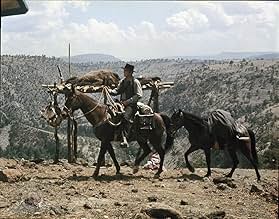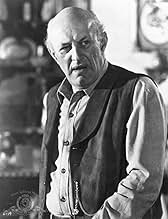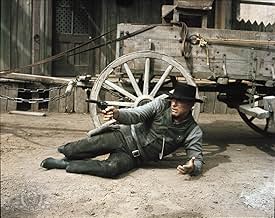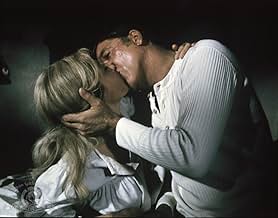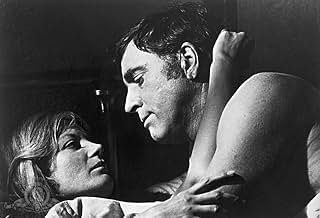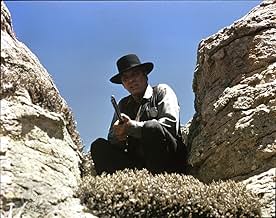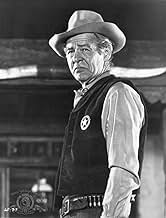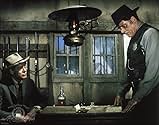AVALIAÇÃO DA IMDb
7,0/10
6,6 mil
SUA AVALIAÇÃO
Um representante da lei Bannock chega no sábado para prender todos os pecuaristas cuja celebração selvagem no ano anterior resultou na morte acidental de um homem idoso.Um representante da lei Bannock chega no sábado para prender todos os pecuaristas cuja celebração selvagem no ano anterior resultou na morte acidental de um homem idoso.Um representante da lei Bannock chega no sábado para prender todos os pecuaristas cuja celebração selvagem no ano anterior resultou na morte acidental de um homem idoso.
William Watson
- Choctaw Lee
- (as William C. Watson)
Avaliações em destaque
There are many fine performances in this film. Robert Ryan is the former hero who now admits he "eats dirt" for a living. Sheree North is at her finest as a lady with a past whose love for her man is unappreciated. Robert Duvall plays an interesting character who pleads not to have his life ruined (but watch the opening scenes closely to see just what he does to someone else's livelihood). Lee J. Cobb gives his usual strong performance as a guy who leads a wild bunch but gave up being wild long ago. I've read many of the reviews on imdb concerning this western, & I have to conclude that only a few writers have understood it well. It's about good & evil, yes, but who is good & who is evil? Does "good" have to be 100% good & does "evil" have to be 100% evil? Obviously not, & that's what this film is about. And towards the very end of the film, just when we think we've figured out who is "mostly good" & who is "mostly evil" we find that even then we may be mistaken. Throughout the film, it seems easy to understand Burt Lancaster's character, because he's so "black & white" & so one dimensional. That's what makes the ending so shocking & so thought provoking: we find out we didn't know Sheriff Maddox (Lancaster) at all, we just thought we did. And aren't appearances deceiving? When I watched it on DVD, "Lawman" caused quite an extended discussion amongst viewers following the film's conclusion, mostly about "Just what happened there?!" That's the sign of an outstanding film, so I rate it 9/10.
This movie stands out as one of the best of a subgenre that doesn't have a lot of great movies representing it. The Post-Western Westerns starting coming out in the mid-sixties until Westerns were hard to come by during the mid-seventies.
These "modern" westerns are distinguished by turning the "white hat good guy" and "black hat bad guy" on their ear. The good guys are not only not perfect, but ruefully flawed, and the bad guys are often people who made mistakes along the way and would not be a threat to society if they were left alone. Examples of other "modern" westerns are Unforgiven (The Clint Eastwood movie), Hang 'Em High (notice a pattern- another Eastwood movie), and Dances With Wolves.
Lancaster's Marshall Maddox is doing his job, but at this stage in his career, he is a walking, talking, killing machine who is ready to kill anyone who gets in his way, and some people who want very much to get out of his way. He is typical of the modern western. Where older westerns emphasized clear moral and ethical boundaries, modern westerns portray a world much less certain and easy to navigate. A world full of shadows and lots of gray ambiguities.
This is a perfect representation of how people felt in 1971. This is a very good film.
These "modern" westerns are distinguished by turning the "white hat good guy" and "black hat bad guy" on their ear. The good guys are not only not perfect, but ruefully flawed, and the bad guys are often people who made mistakes along the way and would not be a threat to society if they were left alone. Examples of other "modern" westerns are Unforgiven (The Clint Eastwood movie), Hang 'Em High (notice a pattern- another Eastwood movie), and Dances With Wolves.
Lancaster's Marshall Maddox is doing his job, but at this stage in his career, he is a walking, talking, killing machine who is ready to kill anyone who gets in his way, and some people who want very much to get out of his way. He is typical of the modern western. Where older westerns emphasized clear moral and ethical boundaries, modern westerns portray a world much less certain and easy to navigate. A world full of shadows and lots of gray ambiguities.
This is a perfect representation of how people felt in 1971. This is a very good film.
Michael Winner's "The Lawman" reveals that a sheriff - traditional officer responsible for law and order, symbol of virtue and right - is 'not' always morally excellent and virtuous or that his prey thoroughly bad...
Burt Lancaster is cast as a merciless avenger, unmoved by love or pity, determined to one end: Exterminate the opposition...
The criminals here are, in fact, some law breakers, drunken cowboys - who by bad luck - have killed an old man during a rough enthusiastic drinking bout...
Lancaster - blind to his faults, unwilling to judge or to be less severe, and with no intention to arrest - hunts his prey down, one by one, until the last man...
There is no poetic eloquence here, no tension as the two protagonists walk slowly towards their duel, no feeling that right is victorious, no good has conquered evil, no decisive clash to capture the audience's imagination... This is pure brutality: Gratuitous graphic sequences - sickening and revolting - of destroyed shoulders and collapsed faces... Uncalled details of death that may damage the sonorous knell of the 'classic Western' with its ideal behavior and precise rules traditionally observed...
The Western showdown is strictly ritual, quick, clean and purely emotional... The outcome predictable... The moment of suspense exciting as anything the cinema has ever produced...
The showdown in "The Lawman" is disturbing in the way of vision... It follows on in the tradition of Palance/Elisha Cook Jr. ultimate confrontation in "Shane," and excels Sam Peckinpah's commitment to an ideal of self-expression through violent death... It may well mean that a film like "Shane," "High Noon," "Vera Cruz," or "The Fastest Gun Alive," can never be made again...
Burt Lancaster is cast as a merciless avenger, unmoved by love or pity, determined to one end: Exterminate the opposition...
The criminals here are, in fact, some law breakers, drunken cowboys - who by bad luck - have killed an old man during a rough enthusiastic drinking bout...
Lancaster - blind to his faults, unwilling to judge or to be less severe, and with no intention to arrest - hunts his prey down, one by one, until the last man...
There is no poetic eloquence here, no tension as the two protagonists walk slowly towards their duel, no feeling that right is victorious, no good has conquered evil, no decisive clash to capture the audience's imagination... This is pure brutality: Gratuitous graphic sequences - sickening and revolting - of destroyed shoulders and collapsed faces... Uncalled details of death that may damage the sonorous knell of the 'classic Western' with its ideal behavior and precise rules traditionally observed...
The Western showdown is strictly ritual, quick, clean and purely emotional... The outcome predictable... The moment of suspense exciting as anything the cinema has ever produced...
The showdown in "The Lawman" is disturbing in the way of vision... It follows on in the tradition of Palance/Elisha Cook Jr. ultimate confrontation in "Shane," and excels Sam Peckinpah's commitment to an ideal of self-expression through violent death... It may well mean that a film like "Shane," "High Noon," "Vera Cruz," or "The Fastest Gun Alive," can never be made again...
Here is another great American Western that slipped under my radar.
Where to start, Dircted by Michael Winner, starring Burt Lancaster in whats got to be the best Western I've seen him in so far, with Robert Ryan, Lee J. Cobb, Robert Duval, Albert Salmi, Ralph Waite, JD Cannon, John McGiver, John Hillerman, Wilford Brimley and Sheree North in whats gotta be the biggest & best role I've seen her in. Plus a great supporting cast of all good actors in realistic parts.
This is sort of a psychological/action Western hybrid with an emphasis on very good action, so its got a lot of dialog but its great dialog that sounds true with a good ear for Western slang.
A guy named Ray Moyer did the set design, and this is another standout of this film, a great job, he is as good as Carlo Simi, I couldn't believe how much detail was crammed into this film. Everything looks spot on, the town set is fantastic, the ranch's are great, interiors highly detailed. Roberto Silva & Herb Westbrook did the Art direction and they deserve mention too.
There is a whore house set thats great it features a crippled gambler/pimp who hobbles about on crutches who is a past friend of Maddox, he has this skull clock sitting on his card table that is a nice touch. All the whores are real looking women not caricatured or dressed overly flashy.
The landscape & town sets were all shot in Durango, Mexico and some of the buttes featured were just beautiful, don't remember seeing these locations before but the rock in the outcrops look similar to those seen in the Magnificent Seven.
The story basically revolves around Bannock Marshall Jared Maddox (Lancaster) a "mankiller" he has the nickname "The Widowmaker". Maddox is after a bunch of drovers who shot up his town during a drunken spree killing an old man. The drovers work for big time cattleman Vincent Bronson (Cobb) near the town of Sabbath, New Mexico.
Maddox has a reputation for being quick on the draw, and always getting his man, we first see him riding into Sabbath with a corpse. He ties up at the Sabbath Marshall Cotton Ryan's (Ryan) office and he tells Ryan what happened and who he's after. Ryan tells him that the men all work for Bronson, and that he'll ride out to the ranch & tell them that Maddox wants to bring them back for trial to Bannock. Bronson's men decide to tough it out and face Maddox.
This film even has a love interest thats handled the just the way it should be in that it doesn't detract from or slow down the narrative one iota.
The score is nothing that sticks in head and pretty forgettable, its not an Spaghetti Western , no picaresque characters or humor, but it does have some SW influenced action as do a lot of the post Leone & Peckinpah films of the 70's.
The ending is worth the price of the DVD which I just ordered. Michael Winner best film, IMO.
Check it out you wont go wrong.
Where to start, Dircted by Michael Winner, starring Burt Lancaster in whats got to be the best Western I've seen him in so far, with Robert Ryan, Lee J. Cobb, Robert Duval, Albert Salmi, Ralph Waite, JD Cannon, John McGiver, John Hillerman, Wilford Brimley and Sheree North in whats gotta be the biggest & best role I've seen her in. Plus a great supporting cast of all good actors in realistic parts.
This is sort of a psychological/action Western hybrid with an emphasis on very good action, so its got a lot of dialog but its great dialog that sounds true with a good ear for Western slang.
A guy named Ray Moyer did the set design, and this is another standout of this film, a great job, he is as good as Carlo Simi, I couldn't believe how much detail was crammed into this film. Everything looks spot on, the town set is fantastic, the ranch's are great, interiors highly detailed. Roberto Silva & Herb Westbrook did the Art direction and they deserve mention too.
There is a whore house set thats great it features a crippled gambler/pimp who hobbles about on crutches who is a past friend of Maddox, he has this skull clock sitting on his card table that is a nice touch. All the whores are real looking women not caricatured or dressed overly flashy.
The landscape & town sets were all shot in Durango, Mexico and some of the buttes featured were just beautiful, don't remember seeing these locations before but the rock in the outcrops look similar to those seen in the Magnificent Seven.
The story basically revolves around Bannock Marshall Jared Maddox (Lancaster) a "mankiller" he has the nickname "The Widowmaker". Maddox is after a bunch of drovers who shot up his town during a drunken spree killing an old man. The drovers work for big time cattleman Vincent Bronson (Cobb) near the town of Sabbath, New Mexico.
Maddox has a reputation for being quick on the draw, and always getting his man, we first see him riding into Sabbath with a corpse. He ties up at the Sabbath Marshall Cotton Ryan's (Ryan) office and he tells Ryan what happened and who he's after. Ryan tells him that the men all work for Bronson, and that he'll ride out to the ranch & tell them that Maddox wants to bring them back for trial to Bannock. Bronson's men decide to tough it out and face Maddox.
This film even has a love interest thats handled the just the way it should be in that it doesn't detract from or slow down the narrative one iota.
The score is nothing that sticks in head and pretty forgettable, its not an Spaghetti Western , no picaresque characters or humor, but it does have some SW influenced action as do a lot of the post Leone & Peckinpah films of the 70's.
The ending is worth the price of the DVD which I just ordered. Michael Winner best film, IMO.
Check it out you wont go wrong.
I rather feel the original "review" on the database misses the point of this dark film. The notion that the community is best served by a rigid, inflexible determination to enforce the letter of the law under all circumstances is indeed the view espoused by the film's main character (played with consummate skill by Burt Lancaster) but the message of the film is surely to point out the limitations of such a view.
Towards the end of the film the Marshall is offered another vision - of a life that contain more than the vendetta, the manhunt, and the inevitable killing that follows. Instead he is tempted by the possibility of a life that offers love, humanity and peace. Unable to change his spots, however, he deliberately throws all that away in a final, senseless act of violence when he shoots in the back a frightened and basically harmless man who is trying to run away - a senseless, brutal and completely unnecessary act of judicial murder. It bears a great resemblance in fact to Harry's similar cold-blooded and pointless execution of his terrorist fugitive at the end of "Harry's Game" and similarly to that, its effect is to arouse disgust at the perpetrator and to alienate our sympathies from what we had previously felt was the "right" side, and to question whether it had really been so "right" all along. The purpose, one feels, of this final killing was not because there was any need for it, but simply to demonstrate the Marshall's defiance of his critics and his determination to continue in the path he had previously followed.
To my mind the film is an intelligent critique of the whole notion of the missionary self-righteousness of this attitude that can arise among self-appointed guardians of the public good, whose original high standards and pure motives are eroded by the violence and the basic inhumanity of the methods they use until they become - as Burt Lancaster actually states in specific terms during the film - just people who are good at killing other people. Siilar themes were explored earlier in "The Searchers" (1956) and "Hang 'em High" (1968) and later in "Unforgiven" (1992) but the message was best expressed to my mind by Peter Shaffer n his play "The Royal Hunt of the Sun" where the young, idealistic but inexperienced squire, Martin, tells his master the conquistador Pizzarro how he feels that a "noble reason" can make the violence of war "glorious". Pizzarro replies: "Give me one reason that stays noble once you start hacking off limbs in its name".
Towards the end of the film the Marshall is offered another vision - of a life that contain more than the vendetta, the manhunt, and the inevitable killing that follows. Instead he is tempted by the possibility of a life that offers love, humanity and peace. Unable to change his spots, however, he deliberately throws all that away in a final, senseless act of violence when he shoots in the back a frightened and basically harmless man who is trying to run away - a senseless, brutal and completely unnecessary act of judicial murder. It bears a great resemblance in fact to Harry's similar cold-blooded and pointless execution of his terrorist fugitive at the end of "Harry's Game" and similarly to that, its effect is to arouse disgust at the perpetrator and to alienate our sympathies from what we had previously felt was the "right" side, and to question whether it had really been so "right" all along. The purpose, one feels, of this final killing was not because there was any need for it, but simply to demonstrate the Marshall's defiance of his critics and his determination to continue in the path he had previously followed.
To my mind the film is an intelligent critique of the whole notion of the missionary self-righteousness of this attitude that can arise among self-appointed guardians of the public good, whose original high standards and pure motives are eroded by the violence and the basic inhumanity of the methods they use until they become - as Burt Lancaster actually states in specific terms during the film - just people who are good at killing other people. Siilar themes were explored earlier in "The Searchers" (1956) and "Hang 'em High" (1968) and later in "Unforgiven" (1992) but the message was best expressed to my mind by Peter Shaffer n his play "The Royal Hunt of the Sun" where the young, idealistic but inexperienced squire, Martin, tells his master the conquistador Pizzarro how he feels that a "noble reason" can make the violence of war "glorious". Pizzarro replies: "Give me one reason that stays noble once you start hacking off limbs in its name".
Você sabia?
- CuriosidadesSome scenes were shot in the same Western location town as Howard Hawks's final film, Rio Lobo (1970). Michael Winner says in his autobiography that the crews of both films met in the middle of the town, as in a Western showdown, but without guns.
- Erros de gravaçãoWhen Maddox (Burt Lancaster) shoots the horse out from under Vernon Adams (Robert Duvall), the man who is thrown from the falling horse has a full head of hair, and is clearly a stunt double. Robert Duvall was totally bald on top in this movie. The stuntman even tries to hide the fact by placing his hand right on top of his head as he comes up, but the full head of hair is still visible.
- Citações
Bannock Marshal Jared Maddox: I remember you at Fort Bliss.
Sabbath Marshal Cotton Ryan: That's my trouble. Everybody remembers me at Fort Bliss.
- Versões alternativasAll UK video versions are cut by 4 secs to remove a cruel horse-fall.
- ConexõesFeatured in Sven Uslings Bio: Lawman (2019)
Principais escolhas
Faça login para avaliar e ver a lista de recomendações personalizadas
- How long is Lawman?Fornecido pela Alexa
Detalhes
- Data de lançamento
- País de origem
- Idioma
- Também conhecido como
- O Homem da Lei
- Locações de filme
- Empresa de produção
- Consulte mais créditos da empresa na IMDbPro
Bilheteria
- Faturamento bruto nos EUA e Canadá
- US$ 5.940.000
- Tempo de duração
- 1 h 39 min(99 min)
- Cor
- Proporção
- 1.85 : 1
Contribua para esta página
Sugerir uma alteração ou adicionar conteúdo ausente


